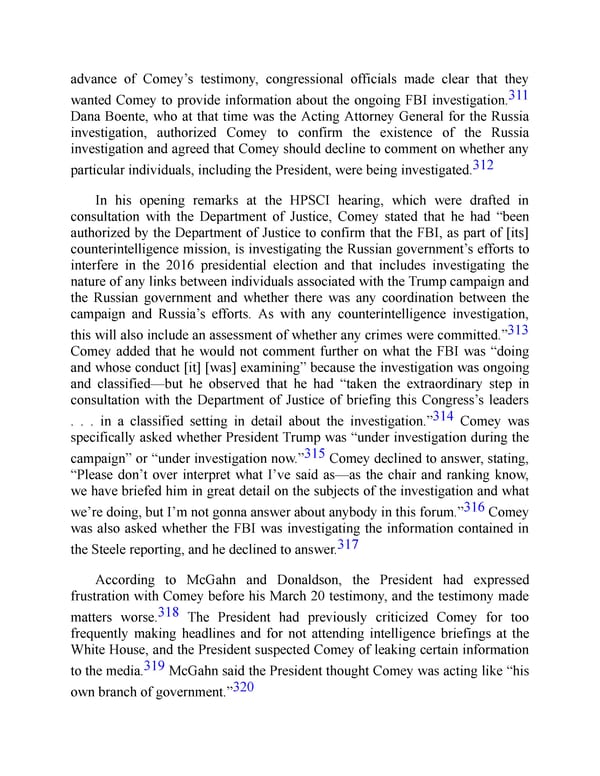advance of Comey’s testimony, congressional officials made clear that they 311 wanted Comey to provide information about the ongoing FBI investigation. Dana Boente, who at that time was the Acting Attorney General for the Russia investigation, authorized Comey to confirm the existence of the Russia investigation and agreed that Comey should decline to comment on whether any 312 particular individuals, including the President, were being investigated. In his opening remarks at the HPSCI hearing, which were drafted in consultation with the Department of Justice, Comey stated that he had “been authorized by the Department of Justice to confirm that the FBI, as part of [its] counterintelligence mission, is investigating the Russian government’s efforts to interfere in the 2016 presidential election and that includes investigating the nature of any links between individuals associated with the Trump campaign and the Russian government and whether there was any coordination between the campaign and Russia’s efforts. As with any counterintelligence investigation, 313 this will also include an assessment of whether any crimes were committed.” Comey added that he would not comment further on what the FBI was “doing and whose conduct [it] [was] examining” because the investigation was ongoing and classified—but he observed that he had “taken the extraordinary step in consultation with the Department of Justice of briefing this Congress’s leaders 314 . . . in a classified setting in detail about the investigation.” Comey was specifically asked whether President Trump was “under investigation during the 315 campaign” or “under investigation now.” Comey declined to answer, stating, “Please don’t over interpret what I’ve said as—as the chair and ranking know, we have briefed him in great detail on the subjects of the investigation and what 316 we’re doing, but I’m not gonna answer about anybody in this forum.” Comey was also asked whether the FBI was investigating the information contained in 317 the Steele reporting, and he declined to answer. According to McGahn and Donaldson, the President had expressed frustration with Comey before his March 20 testimony, and the testimony made 318 matters worse. The President had previously criticized Comey for too frequently making headlines and for not attending intelligence briefings at the White House, and the President suspected Comey of leaking certain information 319 to the media. McGahn said the President thought Comey was acting like “his 320 own branch of government.”
 Mueller Report PDF Page 322 Page 324
Mueller Report PDF Page 322 Page 324